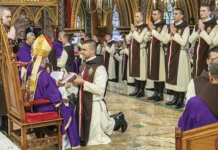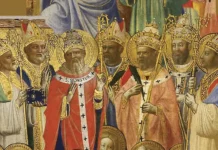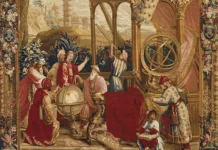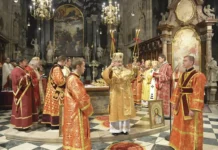Despite the fact that he was born in present-day Hungary, his devotees consider St. Martin of Tours the French Saint par excellence. Why is this?

The son of an official of the Roman army, St. Martin was born in the year 316 in Sabaria, in present-day Hungary. Although of pagan parentage, he became acquainted with Christianity at 10 years of age and desired to receive Baptism. His father, who brought the boy with him on his military missions, was opposed to this. He forced his son, at age 15, to enlist in an imperial cavalry unit, in the service of which Martin set foot in Gaul for the first time.
Soldier, monk and Bishop
It was in French lands that he experienced a turning point in his life. He was 18 and still a catechumen, when, as he galloped along a roadway, he came upon a beggar shivering from the cold. Drawing his sword, he cut his legionary cloak down the middle, and gave one part to the poor man. That night, Jesus Christ appeared to him in a dream, wrapped in the half-cloak, thanking him for having afforded Him warmth that day. This special grace reinvigorated Martin’s desire to be Baptized without delay.
Under the auspices of St. Hilary, Bishop of Poitiers, he founded, on the outskirts of the city, the first monastic community of France, in which he spent approximately 15 years studying Sacred Scripture and tirelessly evangelizing the environs.
The faithful of Civitas Turonorum (present-day Tours) obliged him to leave his beloved retreat and elected him, against his will, as Bishop of this diocese in 371, when he was 55. From Tours, he spread Christian doctrine throughout Gaul, until the year 397, when he departed for Heaven, at 81 years of age.
A monk, Bishop and missionary, St. Martin is the first non-martyr to have received the cultus of Saint in the history of the Church. God did not call him to end his life in the claws or the fangs of wild beasts or by the blow of sword or axe, but to shed the blood of his soul by giving of himself unsparingly in the service of neighbour. In this, he revealed himself to be an authentic hero of the Faith and one of the brightest figures of French religion and culture.
“I will be Baptized….”
Until around the year 496, Clovis, King of the Franks, resisted being instructed in Christian doctrine, despite the gentle insistence of his wife, St. Clotilde. He changed his mind during the Battle of Tolbiac, when he saw his army threatened with imminent defeat by the Alamanni. After vainly invoking the aid of all of the pagan gods of war, he remembered the God of his wife and made this promise: “God of Clotilde, if You grant me victory, I will be baptized.” He was victorious, and received Baptism, together with three thousand Frankish soldiers.
Eleven years later, this time in war against Alaric II, Arian king of the Visigoths, Clovis made a pilgrimage to the tomb of the Holy Bishop, to seek his support in the fight against the heretics. Having been generously heeded, he returned to Tours to offer thanksgiving.
Briefly put, St. Martin sanctified himself in Frankish land, and in these lands his fame of holiness grew and spread across the centuries.
Accordingly, despite the fact that he was born in a city in present-day Hungary, his devotees consider him the French Saint par excellence. Of his nationality, the claim made of the soldiers of the Foreign Legion can even more rightly be applied to him: Français! Non pas par le sang reçu, mais par le sang verse — French! Not by blood received, but by blood spilled. ◊






